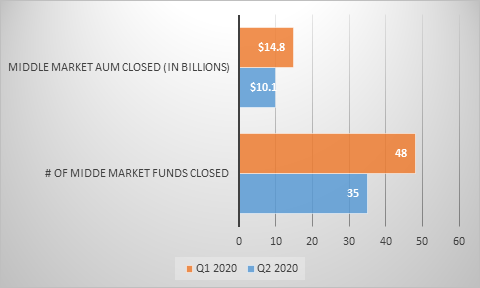COVID-19 Stifles Middle Market Private Equity Dealmaking
Middle market private equity deals and fundraising activity slowed through the second quarter of 2020 as the pandemic continued to ravage businesses. And there is a troubling sign of what may be an ongoing M&A trend through the rest of the year.
 By Anthony DeCandido, CPA
By Anthony DeCandido, CPA
U.S. middle market private equity deals and fundraising activity slowed through the second quarter of 2020 as the global health pandemic continued to ravage American business.
According to PitchBook, the number of closed middle market funds (defined as individual funds with assets under management of $1 billion or less) was only 35 during the second quarter, representing $10.1 billion of assets, a 27% decline from the previous quarter.
This represents a $4.7 billion decrease from the first quarter and indicates that many investment managers suspended or canceled previously agreed-upon deals.
The third quarter does not show much improvement, despite a steady reopening of the economy. Over the first half of the third quarter, 20 middle market buyout funds came to market, suggesting that this quarter’s tally will be slightly higher than the previous quarter, barring any major setbacks in the fight against the coronavirus.
There is a troubling sign, however, of what may be an ongoing M&A trend through the rest of the year: middle market funds are not hitting their fundraising targets. Through Aug. 15, of those middle market funds reporting results, only 37% achieved their target fund size. And these results could be worse if those figures included funds that did not report results.
Middle Market Private Equity Deal Making Has Cooled as the Pandemic Has Spread

Source: PitchBook
COVID-19 Response for Private Equity
With reduced dealmaking, private equity firms are left to prioritize their existing portfolio investments and must measure the continuing uncertainty created by the pandemic.
Firms not only must consider liquidity risk and cash flows at their portfolios but they should also factor in how declining interest rates create opportunities for the type of capital investment that will be needed to propel growth and drive operating agendas. With so much uncertainty in the economy, it’s difficult to draw the line between investing in the future and hunkering down to sustain existing business practices.
Matching employee resources with changes in consumer demand is also a priority for private-equity-owned businesses. The result has been that many operators are investing to improve their virtual interactions with customers and employees, and are upgrading their technology infrastructure to promote work-from-home options.
Many operators are also taking the chance to address social unrest in the United States by ensuring that their practices align with employee values. Doing so creates the type of engaged and motivated workforce that is necessary to create business value out of the crisis.
Last, general partners are evaluating the political landscape and how the results of the election in November may affect their businesses. A change in the White House and Congress could bring higher business taxes and more vigorous regulatory oversight, a possibility that is leading some managers to consider whether they pause, suspend, or accelerate deals.
Anthony DeCandido, CPA, is partner, Financial Services Industry Eminent, with RSM in Stamford, Conn. He can be reached at anthony.decandido@rsmus.com.
Learn more about mergers and acquisitions at the PICPA Transaction Advisory Services Conference on Nov. 18.
Sign up for weekly professional and technical updates in PICPA's blogs, podcasts, and discussion board topics by completing this form.
PICPA Staff Contributors
Disclaimer
Statements of fact and opinion are the authors’ responsibility alone and do not imply an opinion on the part of PICPA officers or members. The information contained in herein does not constitute accounting, legal, or professional advice. For professional advice, please engage or consult a qualified professional.






